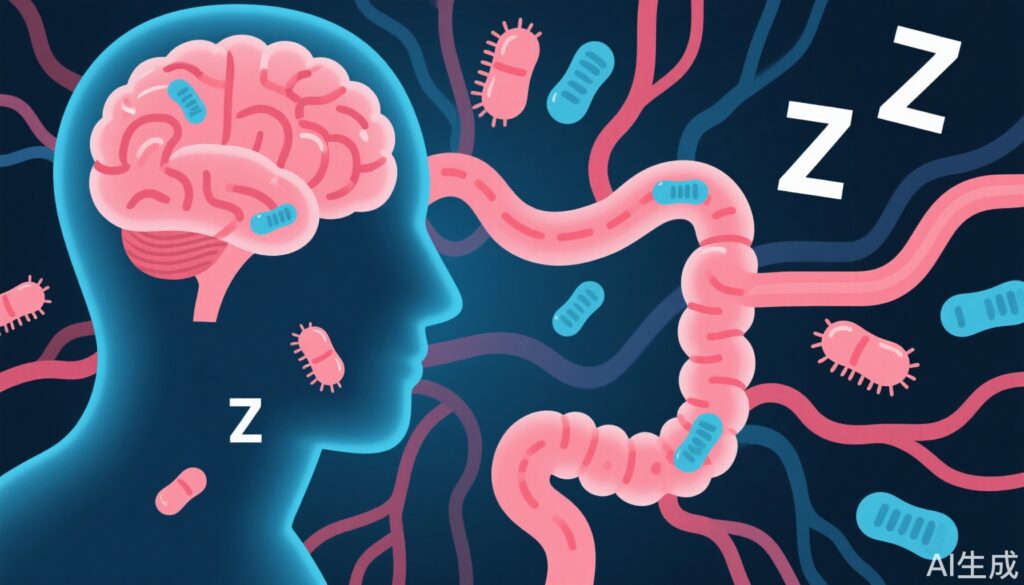Highlight
– Specific gut bacterial taxa may causally contribute to the risk of insomnia.
– Insomnia itself may alter the abundance of certain gut bacteria, indicating a bidirectional relationship.
– Mendelian randomization analysis identified 41 bacterial groups linked to insomnia risk with some showing stronger causal evidence.
– Experts advise caution in attributing causality due to potential confounding and population limitations.
Study Background and Disease Burden
Insomnia is a prevalent sleep disorder characterized by difficulties initiating or maintaining sleep, affecting quality of life and increasing risk for psychiatric and metabolic diseases. Recent research has increasingly acknowledged the gut-brain axis as a potential modulator of neurological and psychiatric conditions, including sleep disorders. The gut microbiome—the collective community of microorganisms in the gastrointestinal tract—has emerged as an influential factor in neurobehavioral health. However, establishing a causal relationship between specific gut bacteria and insomnia has remained challenging due to confounding factors and bidirectional influences.
Study Design
To investigate potential causal links between gut microbiota composition and insomnia, researchers led by Shangyun Shi at Nanjing Medical University employed a two-sample Mendelian randomization (MR) approach. MR uses genetic variants as instrumental variables to infer causality, thereby minimizing confounding and reverse causation biases.
The study utilized genome-wide association study (GWAS) summary statistics of insomnia from 386,533 individuals and integrated gut microbiome data from two large cohorts: 18,340 participants from the MiBioGen Alliance and 8,208 from the Dutch Microbiome Project. MR was applied bidirectionally to assess whether genetically predicted gut microbiota abundance influences insomnia risk and whether genetic predisposition to insomnia affects gut microbiota composition.
Key Findings
The MR analysis identified 14 bacterial groups potentially increasing insomnia risk, exhibiting odds ratios (OR) ranging from 1.01 to 1.04, and eight bacterial groups associated with a decreased risk (ORs 0.97–0.99).
Data from the Dutch cohort corroborated these findings with similar OR estimates, but after adjustments for multiple testing using false discovery rate (FDR) correction, only the association with Clostridium innocuum remained statistically significant (FDR = 0.007).
Reverse MR analyses revealed that insomnia genetically influences gut microbiota, with increases of up to 4.43-fold in the abundance of 12 bacterial taxa and decreases between 43% and 79% in seven other taxa. Notably, a bidirectional causal relationship was observed between Odoribacter species and insomnia within the Dutch dataset.
The authors conducted sensitivity analyses to test for pleiotropy (where genetic variants affect multiple traits) and reported none, reinforcing the robustness of inferred causal links. The study identified a total of 41 gut bacterial taxa with potential causal associations with insomnia.
Expert Commentary
While this study represents an advance by leveraging MR methodology to dissect complex microbiota-insomnia associations, external experts remain cautious in interpreting these associations as definitively causal. The modest odds ratios for many bacterial groups denote small effect sizes. Moreover, participants were primarily of European descent, limiting extrapolation to diverse populations with differing microbiota profiles.
Environmental and lifestyle factors such as diet, stress, and medications—known influencers of both insomnia and gut microbiome—were not accounted for by the genetic analysis, constraining causal inference. Experts also note that MR assumptions, while mitigating some biases, cannot completely exclude horizontal pleiotropy or unmeasured confounding.
Mechanistically, gut bacteria may impact insomnia through modulation of host neurotransmitters, immune signaling, or metabolite production, though direct functional studies are needed to elucidate pathways. The bidirectional relationship observed emphasizes the complexity of gut-brain interactions in sleep regulation.
Conclusion
This study provides preliminary evidence supporting a bidirectional causal association between specific gut microbiota taxa and insomnia risk. It highlights Clostridium innocuum and Odoribacter species as key bacterial groups warranting further mechanistic and interventional research.
However, clinical translation requires cautious interpretation given the study’s population and methodological limitations. Future research integrating environmental factors, longitudinal study designs, and functional microbiome analyses could clarify causal pathways and enable microbiome-targeted therapeutic strategies for insomnia.
References
Yang J, Su T, Zhang Y, Jia M, Yin X, Lang Y, Cui L. A bidirectional Mendelian randomization study investigating the causal role between gut microbiota and insomnia. Front Neurol. 2023 Dec 7;14:1277996. doi: 10.3389/fneur.2023.1277996 . PMID: 38145126 ; PMCID: PMC10740168 .



